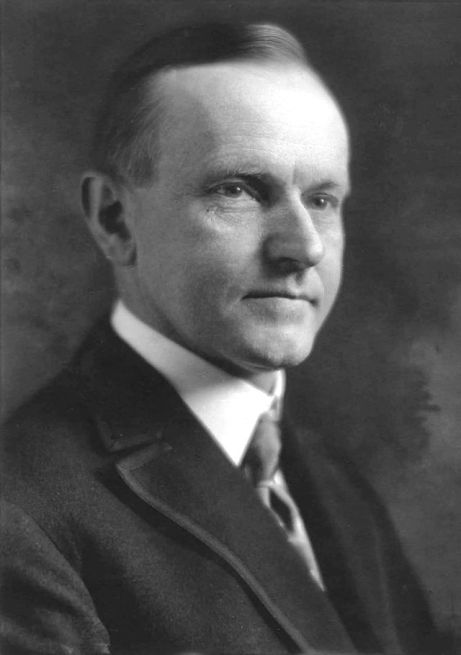The Coolidge family were awakened by a Post Office messenger pounding on the door. He brought two telegrams: one from Harding’s secretary giving official notification of the President’s death, the second from the Attorney-General advising Coolidge to qualify immediately for the office by taking the oath. It was just a tiny farmhouse sitting-room, with an airtight wood stove, an old-fashioned walnut desk, a few chairs, and a marble-topped table on which stood the old family Bible, open. As he read the last words of the oath, the younger Coolidge placed his hand on the book and said, with great solemnity, ‘So help me God.’
Coolidge was accomplished at both city and state finance, paying off debt, accumulating surpluses, and so, as a result, raising salaries of state teachers and attracting the best.
‘Don’t hesitate to be as revolutionary as science.’
‘Government cannot relieve from toil.’
‘The normal must take care of themselves.’
‘Self-government means self-support.’
‘Large profits mean large pay rolls.’
‘Inspiration has always come from above.’
It was essential, he argued, to judge political morality not by its intentions but by its effects. Thus, in his 1925 inaugural, the key sentence was ‘Economy is idealism in its most practical form.’
Business was the pursuit of gain but it also had a moral purpose. ‘It rests squarely on the law of service. It has for its main reliance truth and faith and justice.’ That was why government had a warrant to promote its success by providing the conditions of competition within a framework of security. The job of government and law was to suppress privilege wherever it manifested itself and uphold lawful possession by providing legal remedies for all wrongs. The more business regulated itself the less need there would be for government to act to insure competition. It could therefore concentrate on its twin tasks of economy and of improving the national structure within which business could increase profits and investment, raise wages and provide better goods and services at the lowest possible prices.
'Life is service. The one who progresses is the one who gives his fellow human beings a little more, a little better service.' (Ellsworth Milton Statler, founder of the Pennsylvania Hotel, plaque in the lobby).
‘An examination of the records of those Presidents who had served eight years will disclose that in almost every instance the latter parts of their term have shown very little in the way of constructive accomplishment. They have often been clouded with grave disappointments.’
Coolidge was a New England Puritan.
Coolidge himself was certain the market would break. That was his private sentiment, reflected in his wife Grace’s remark: ‘Poppa says there’s a depression coming.’
Coolidge’s advice to angry farmers’ delegation which came to him asking for federal cash had been bleak: ‘Take up religion.’

